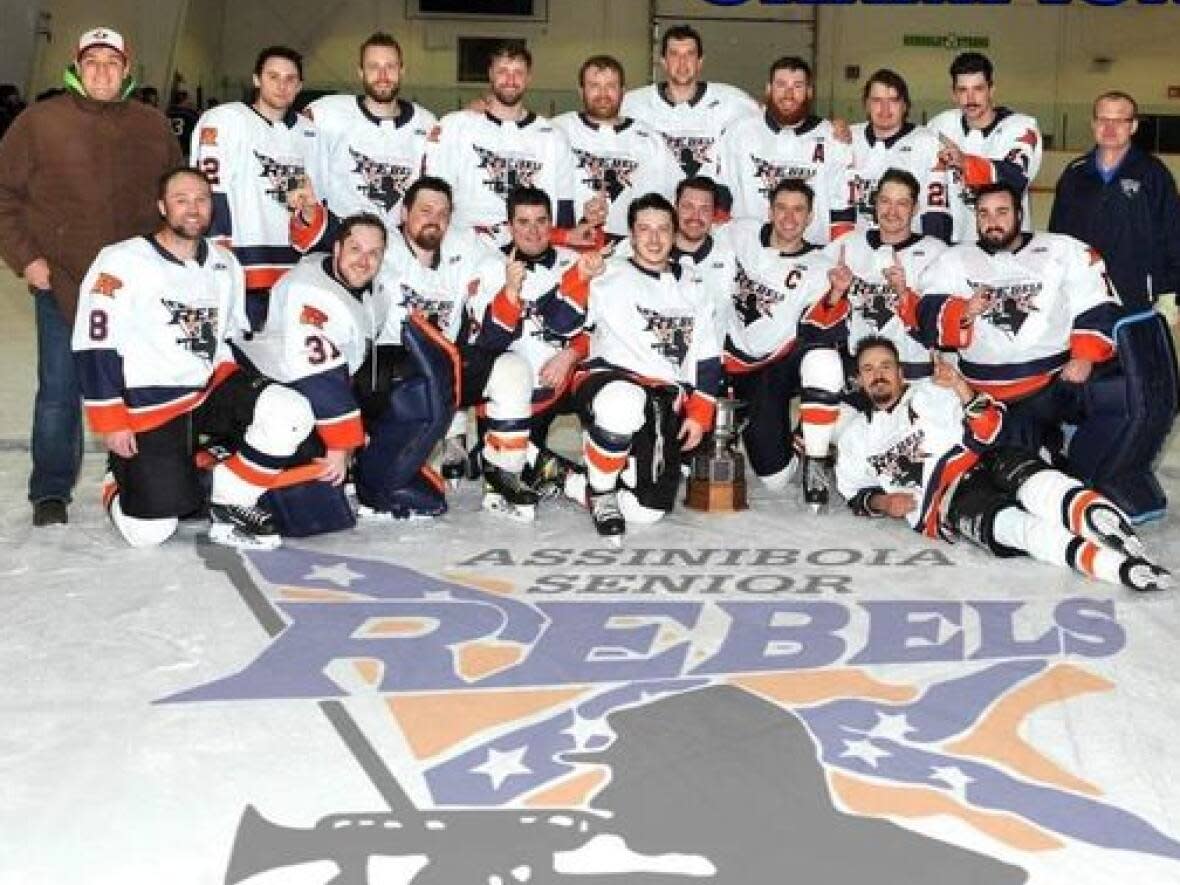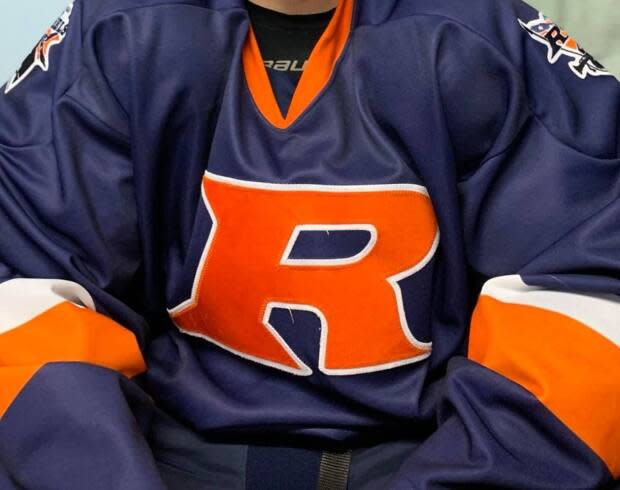Sask. senior hockey team says it plans to remove Confederate flag from its logo

A senior hockey team in southern Saskatchewan says it will change its team logo, which features a Confederate flag, as soon as it can afford to.
The Assiniboia Rebels Senior Hockey Club's current logo features the silhouette of a bugler with a Confederate flag waving in the background above him.
"We are aware of the complaint and the concerns brought forward. As a group we have already started discussions and we will be phasing our logo out as soon as we are financially able to do so," the team said in a statement sent to CBC.
It did not provide information on how much the logo alteration would cost or how soon it might be made.
Photos from the team's Facebook profile show the logo in 2011, while the most recent photo is from their championship victory in 2022. It shows the team with their white home jerseys featuring the logo on the front.
The team also has photos posted to social media from 2020 with an alternate dark-coloured jersey that features a large letter "R."

The logo is included in the town's new $18-million recreation centre, called the Southland Co-op Centre, also known as the Town of Assiniboia and District Recreation Complex.
The facility was completed in mid-September, according to a news release. It's expected to be fully operational before the end of September.
The federal government provided nearly $6.3 million for the facility from its Investing in Canada infrastructure program, while more than $5.2 million came from the Saskatchewan government.

The remainder of the price tag was covered by the town, about 135 kilometres southwest of Regina, and fundraising efforts, the news release says.
In the release, Assiniboia Mayor Sharon Schauenberg said, "Recreational facilities, especially in small towns, become the meeting place for all to gather and create memories."
The fact that the symbol is there will tell enough people that you're not supposed to be in this space. - Courtney Szto, kinesiology and health studies professor at Queen's University
The recreation and community wellness manager for the Town of Assiniboia, Stephanie VanDeSype, told CBC in an email that the "Senior Rebels organization is very quickly having a new logo made, and the new logo will replace the one on their jerseys and in their dressing room.
"We understand that this logo is offensive, which is why it is being changed as we speak."
VanDeSype directed additional questions to a team official, who declined for a request for an interview on Friday.
During an interview Thursday, before the team issued their statement, Carol LaFayette-Boyd, the volunteer executive director of the Saskatchewan African Canadian Heritage Museum in Regina, said she felt the team didn't understand the meanings or the significance of the flag.
"That's what I would choose to believe anyway, because I would hope our Saskatchewan people are above that," she said.
"I understand it's an adult group and I don't think they would want their children knowing they support something like that."
LaFayette-Boyd says while it may cost some money to make the change, the team should get rid of the logo.

Courtney Szto, an assistant professor in kinesiology and health studies at Queen's University in Ontario, questioned why the Confederate flag has a place in Canada, given its history in the United States. However, she added, it's become more prominent recently in events such as the Ottawa convoy protest.
She says the flag can represent different views, but it consistently represents racism and white supremacy, and would communicate that some people are not welcome in the arena while providing a "safe space" to people who believe in its racist values.
While some consider it to be a symbol of southern pride, it's known as a symbol of slavery and is used by extremist groups, including the white supremacist Klu Klux Klan.
"No one has to say anything, but just the fact that the symbol is there will tell enough people that you're not supposed to be in this space," Szto said.
Szto calls hockey white-centric and not very inclusive, referring to controversial team logos, including Indigenous mascotry or other symbols, that have changed following criticism.
In Saskatchewan, Western Hockey League teams such as the Moose Jaw Warriors and Prince Albert Raiders changed their logos, with the Raiders stating their transition was because of the "insensitive and offensive" design.
"It's hard to know what one's intention is behind [it] but in anti-racism work it's not about the intention, it is about the impact," Szto said.
"That is definitely a symbol that will say to many people, 'this is not a rink that I want to hang out in, this is not a team that I want to support, and this is not a place that I want to spend a lot of time in.'"


